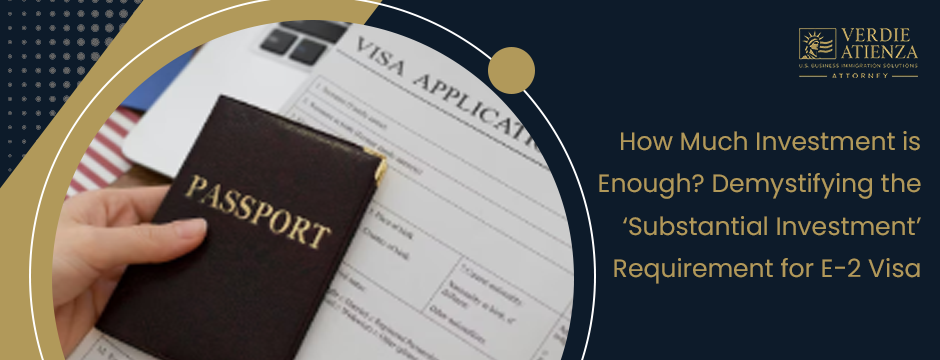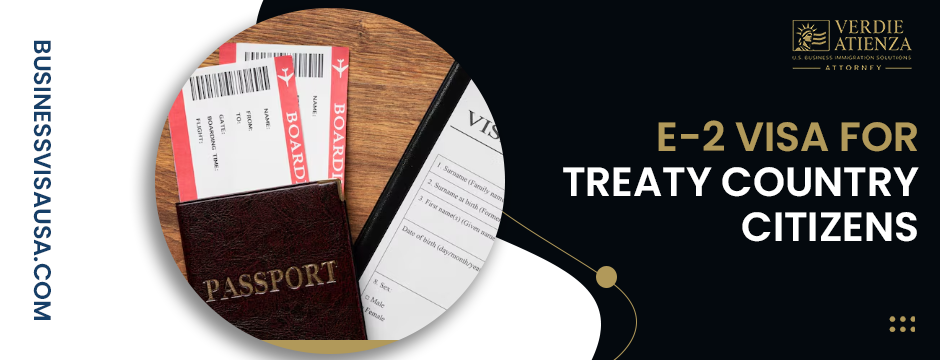How Much Investment is Enough? Demystifying the ‘Substantial Investment’ Requirement for E-2 Visa

When entrepreneurs from treaty countries look to expand their horizons in the United States, the E-2 visa often stands out as an attractive path. It allows treaty country citizens to live in the U.S. while running or investing in a business. Yet, one recurring question stops many in their tracks: How to qualify for e-2 visa?
This question is more than just legal jargon. It is about understanding what the U.S. government expects, how you can position your business to qualify, and how to avoid mistakes that might put your dream on hold. At Business Visa USA, we work closely with investors and entrepreneurs to make this process clearer, faster, and more achievable.
In this blog, we’ll break down what “substantial investment” really means, the factors immigration officers evaluate, and how to build a strategy that increases your chances of approval. Whether you are still researching or ready to apply, this guide will provide practical insights to help you take the right steps.
Understanding the E-2 Visa for Treaty Country Citizens
The E-2 visa is available to citizens of countries that maintain treaties of commerce and navigation with the United States. Unlike other investor visas, there is no set minimum dollar amount written into law for the E-2. Instead, the government uses the phrase “substantial investment,” leaving applicants uncertain about what qualifies.
e-2 visa for treaty country citizens, the advantage of the E-2 visa is flexibility. You do not need to invest millions as required for an EB-5 visa. Instead, you need to show that your investment is large enough to make the business viable and credible.
What “Substantial Investment” Really Means
The term “substantial” is not a fixed number. It is a relative concept, judged by the type of business you are starting or buying. Immigration officials consider factors such as:
-
Proportionality Test
Your investment is compared to the total cost of purchasing or establishing the business. For example, if you are opening a small café that requires $150,000 in startup costs, investing $120,000 may be considered substantial because it covers most of the cost.
-
Business Viability
The business should have the capacity to generate income that is more than enough to provide for you and your family. It cannot be a marginal venture that barely sustains one individual.
-
Commitment of Funds
The investment must be “at risk,” meaning the money is already committed to the business. Placing funds in an account without using them for business expenses does not meet the standard.
-
Nature of the Industry
A tech startup may require less capital to launch compared to a manufacturing unit. Immigration officers evaluate the typical capital requirements for your chosen industry.
Typical Investment Ranges That Work
While there is no official minimum, real-world experience shows that:
- Investments of $100,000 to $200,000 often meet the substantial threshold for many service-based or retail businesses.
- For industries with higher startup costs, such as manufacturing, logistics, or hospitality, investments above $250,000 are more common.
- Although smaller investments around $50,000 to $80,000 can sometimes qualify, these cases are heavily scrutinized. Success depends on proving that the business will create jobs, generate revenue, and operate as more than a side project.
At Business Visa USA, we guide clients in aligning their business model with what adjudicators want to see. This increases the likelihood that your investment is viewed as substantial and credible.
How to Qualify for E-2 Visa with the Right Investment
Many entrepreneurs mistakenly focus only on the amount of money. While investment size is critical, officers look at the overall picture. To strengthen your case, make sure to cover these points:
-
Detailed Business Plan
A comprehensive, realistic business plan is your strongest ally. It should outline your financial projections, market research, staffing plan, and how your business will contribute to the U.S. economy.
-
Source of Funds
You must prove your investment money comes from a legitimate source. Tax records, bank statements, and sale agreements can help document this.

-
At-Risk Requirement
Funds must already be spent or irrevocably committed. Paying for leases, equipment, or initial marketing expenses demonstrates your commitment.
-
Job Creation
While not mandatory, showing plans to hire U.S. workers can significantly strengthen your case. This reinforces that your business is not marginal.
- Industry Choice
Certain industries are easier to present as credible E-2 businesses. Franchises, service companies, restaurants, consulting firms, and small retail operations often work well because they demonstrate practical revenue models.
Common Mistakes That Lead to E-2 Visa Denials
Many treaty country citizens underestimate how carefully applications are reviewed. Here are mistakes you should avoid:
- Investing too little relative to the business type.
- Failing to commit funds before applying. Immigration officers want proof of real financial risk.
- Poor business planning, including unrealistic projections or lack of clarity about operations.
- Choosing a marginal business that only supports the investor’s family without creating wider economic benefit.
By steering clear of these errors, your application stands a much better chance.
From Investment to Approval: The Marketing Perspective
Think of your E-2 visa application as a sales pitch. You are not just presenting numbers; you are convincing an adjudicator that your business is viable, substantial, and worthy of approval. Just as in marketing, presentation matters:
- Clarity sells. A well-structured business plan is like a strong marketing brochure that reassures investors. In this case, the investor is the U.S. government.
- Credibility matters. Demonstrating that your funds are committed and your business model is practical builds trust.
- Vision inspires. Showing growth potential, expansion opportunities, and job creation aligns with the U.S. economy’s interests.
At Business Visa USA, we take this marketing approach seriously. We help clients package their story in a way that appeals to immigration officers while staying legally compliant.
Long-Term Considerations
E-2 visas are not permanent. They are granted for up to five years and can be renewed as long as the business remains active and profitable. This means your initial investment should not only qualify you for approval but also sustain the company long enough to keep your visa valid in the future.
Why Work With Business Visa USA
Understanding how much to invest is only one piece of the puzzle. Positioning your investment effectively, preparing airtight documentation, and aligning your business model with U.S. immigration expectations require professional expertise.
At Business Visa USA, we specialize in helping treaty country citizens succeed with their E-2 visa applications. From identifying the right business models to crafting detailed business plans and guiding you through the process, we act as your partner in this journey.
Our goal is to simplify the path and help you present your case in the strongest way possible. With our experience, you can approach the process with clarity and confidence.
Final Thoughts
The phrase “substantial investment” may sound vague, but it doesn’t have to remain a mystery. By understanding how immigration officials evaluate E-2 visa for treaty country citizens applications, you can take control of your journey.
Whether your budget is $100,000 or $500,000, the key lies in aligning your investment with the size, nature, and goals of your business. Combine that with a strong business plan and committed funds, and your chances of approval rise significantly.
If you are ready to take the next step, let Business Visa USA guide you. Your dream of living and working in the United States as an entrepreneur starts with the right strategy and the right investment.